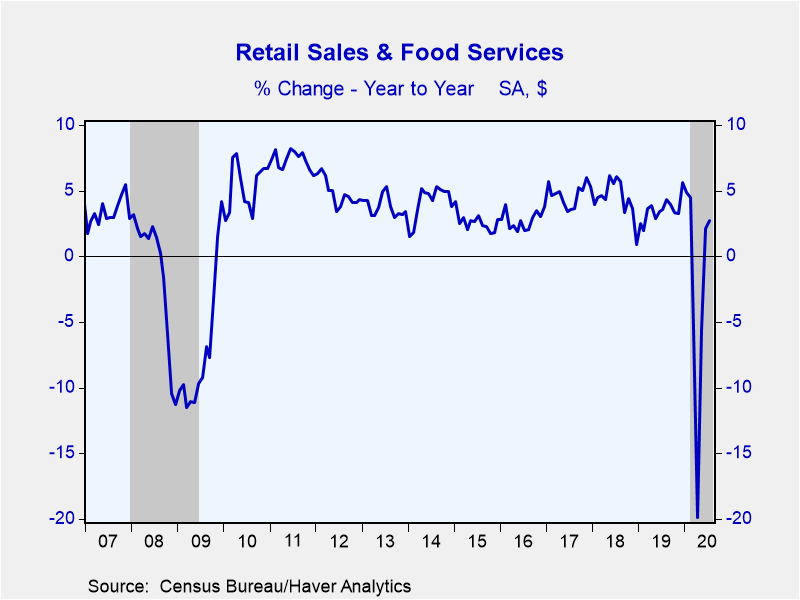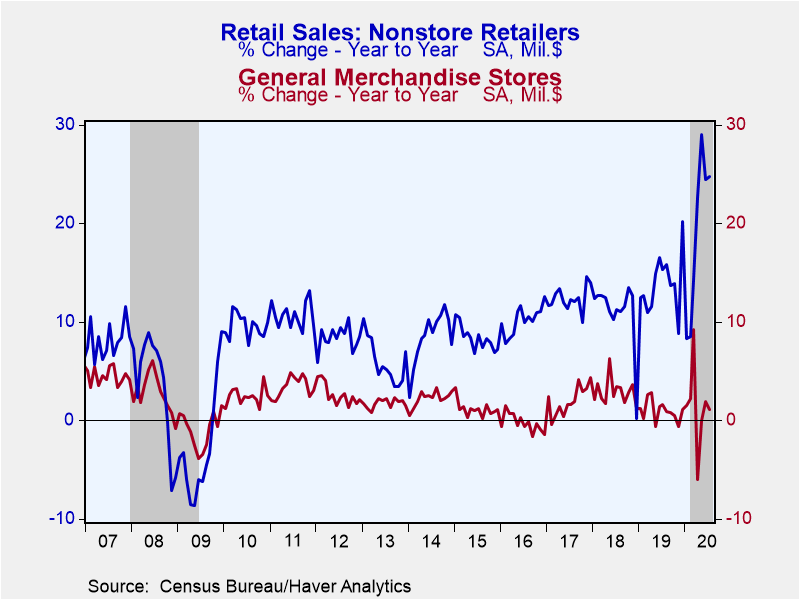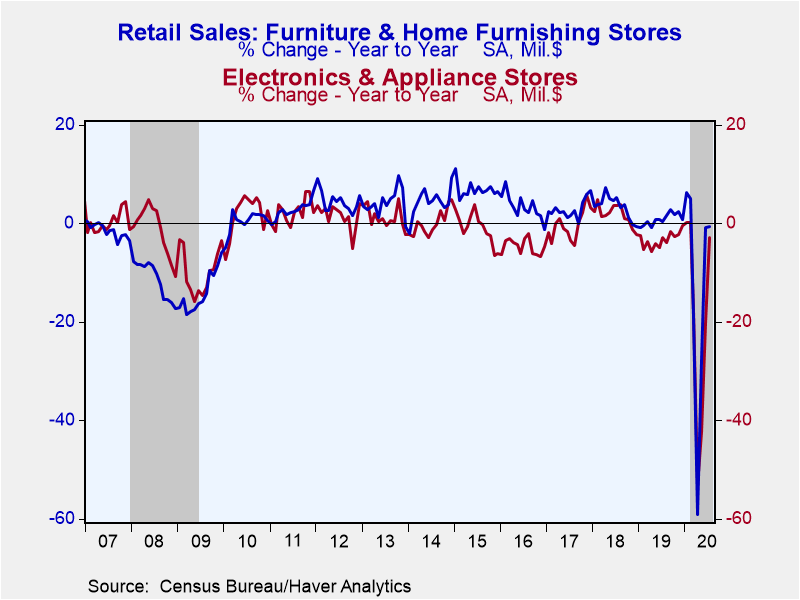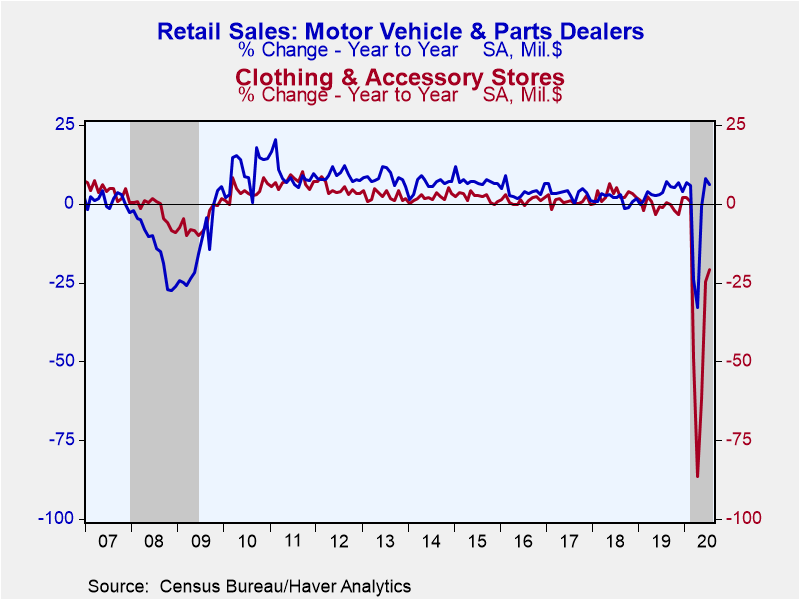 Global| Aug 14 2020
Global| Aug 14 2020U.S. Retail Sales Post Firm Increase in July
by:Tom Moeller
|in:Economy in Brief
Summary
• Consumer spending stays strong for third straight month. • Auto sales decline holds back total. The consumer continues to spend, following coronavirus shutdowns in the spring. Total retail sales, including food service [...]
• Consumer spending stays strong for third straight month.
• Auto sales decline holds back total.
The consumer continues to spend, following coronavirus shutdowns in the spring. Total retail sales, including food service establishments, increased 1.2% (2.7% y/y) during July following an 8.4% June rise, revised from 7.5%. A 1.8% gain had been expected in the Action Economics Forecast Survey. Retail sales excluding motor vehicles & parts improved 1.9% last month after strengthening 8.3% in June, revised from 7.3%. A 1.3% rise had been anticipated. In the retail control group, (which excludes autos, gas stations, building materials & food services), sales rose 1.4% (8.0% y/y) after improving 6.0% in June and 10.4% in May. Retail sales excluding restaurants improved 0.8% (5.8% y/y) after a 6.8% jump.
Sales of motor vehicle & parts dealerships eased 1.2% in July, in contrast to a 10.2% m/m rise in unit sales reported earlier this month. It followed a 9.1% June gain which came after a nearly one-half m/m May rise. Gasoline & service station sales improved 6.2% (-15.6% y/y), even though prices were fairly steady m/m.
Sales of nonstore retailers improved 0.7% (24.7% y/y) after a 2.1% decline. General merchandise stores sales eased 0.2% (+1.1% y/y) after strong growth in the earlier two months. Department store sales edged 0.1% higher (-13.4% y/y), also following two months of strong increase. Building materials & garden store sales declined 2.9% (+14.8% y/y) after improving 0.8% in June.
Apparel & accessory store sales strengthened 5.7% in July (-20.9% y/y) after surging 98.8% in June and 180.1% in May. Furniture & home furnishing store sales held steady (-0.7% y/y) following a 37.4% jump and surging 77.1% in May. Electronics & appliance store sales rose 22.9% (-2.8% y/y), the third straight month of double-digit improvement. Sporting goods, hobby, book & music store sales fell 5.0% (+17.8% y/y) after a 27.6% rise.
Grocery & beverage store sales improved 0.2% (11.1% y/y) following a 1.5% June decline. In another nondiscretionary category, health & personal care products sales strengthened 3.6% in July (3.2% y/y) after two months of strong increase.
Eating out remained in vogue as restaurant and drinking establishment sales rose 5.0% last month (18.9% y/y) after strengthening in each of the two prior months.
The retail sales data can be found in Haver's USECON database. The Action Economics forecast is in the AS1REPNA database.
| Retail Spending (% chg) | Jul | Jun | May | Jul Y/Y | 2019 | 2018 | 2017 |
|---|---|---|---|---|---|---|---|
| Total Retail Sales & Food Services | 1.2 | 8.4 | 18.3 | 2.7 | 3.5 | 4.4 | 4.7 |
| Excluding Autos | 1.9 | 8.3 | 12.3 | 1.9 | 3.5 | 5.2 | 5.0 |
| Retail Sales | 0.8 | 6.8 | 17.3 | 5.8 | 3.4 | 4.2 | 4.6 |
| Retail Less Autos | 1.5 | 6.2 | 10.5 | 5.7 | 3.3 | 5.1 | 4.9 |
| Motor Vehicle & Parts | -1.2 | 9.1 | 48.3 | 6.1 | 3.8 | 1.4 | 3.4 |
| Food & Beverage Stores | 0.2 | -1.5 | 2.2 | 11.1 | 2.5 | 2.9 | 4.1 |
| Gasoline Service Stations | 6.2 | 14.8 | 12.0 | -15.6 | -0.6 | 9.3 | 9.4 |
| Food Service & Drinking Places | 5.0 | 26.7 | 31.3 | -18.9 | 4.6 | 5.8 | 5.7 |
Tom Moeller
AuthorMore in Author Profile »Prior to joining Haver Analytics in 2000, Mr. Moeller worked as the Economist at Chancellor Capital Management from 1985 to 1999. There, he developed comprehensive economic forecasts and interpreted economic data for equity and fixed income portfolio managers. Also at Chancellor, Mr. Moeller worked as an equity analyst and was responsible for researching and rating companies in the economically sensitive automobile and housing industries for investment in Chancellor’s equity portfolio. Prior to joining Chancellor, Mr. Moeller was an Economist at Citibank from 1979 to 1984. He also analyzed pricing behavior in the metals industry for the Council on Wage and Price Stability in Washington, D.C. In 1999, Mr. Moeller received the award for most accurate forecast from the Forecasters' Club of New York. From 1990 to 1992 he was President of the New York Association for Business Economists. Mr. Moeller earned an M.B.A. in Finance from Fordham University, where he graduated in 1987. He holds a Bachelor of Arts in Economics from George Washington University.










